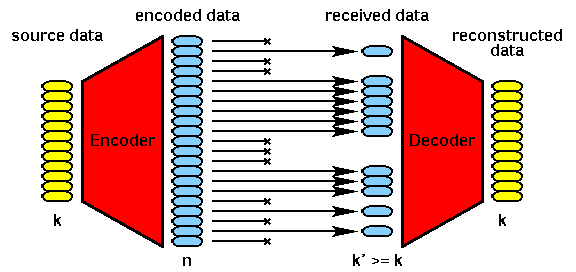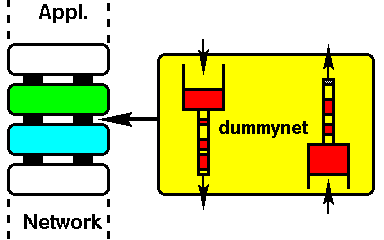See also a more detailed description of dummynet and forward error correction.
This is a largely revised version of an older tech report).
(compressed postscript)
Source code for the device driver described in this paper is now in the FreeBSD distribution.
(uncompressed postscript, 218KB)
Updated C Source for the code described in this paper
uncompressed postscript (198KB)
C Source for the code described in this paper (also available as vdm.tar.gz)
Software FEC in computer communications

This page describes some applications of Forward Error Correction (FEC) in computer communication. It includes some papers describing principle of operation and applications of FEC, and portable C implementation of erasure codes which can be effectively implemented on ordinary workstations at a speed of 1..10MB/s. They can be used to reduce the error rate on unicast communications, or for a number of applications on reliable and unreliable multicast communications. Also available is the code for a Reliable Multicast data Distribution Protocol (RMDP) based on FEC.
The original research dates to 1996-1998.
Dummynet: a simple approach to the evaluation of network protocols
(Also available as gzipped Postscript)
In this paper we show how the evaluation of network protocols can be done on a standalone system using real traffic generators (e.g. FTP, WWW servers, etc.) and still accounting for limited-size queues, bandwidth limitations and communication delays. Source code for FreeBSD 2.1 (easily portable to other BSD-derived systems) is available.
A new version of the code, largely improved and more flexible, is available here. The new version supports all IP traffic, including multicast, and parameters are configurable using the IPFW command per flow.
Replacement policies for a proxy cache
In this paper we analyse Web access to a proxy in order to derive useful information for the development of a good replacement policy for documents held in the cache. We show that LRU works reasonably well, but it can be improved by considering other parameters than time. Basing on the analysis of traces, we propose a policy called LRV which outperforms LRU and other known policies.A very fast algorithm for RAM compression
Experiments have shown that RAM pages are often filled with many zero-valued entries. This suggests the use of fast compression algorithms to save compressed pages to memory instead of swapping them to disk. In this way, the latency of pagein can be sensibly reduced. The paper presents a very fast algorithm which, while not as effective as gzip, can compress 4KB pages at over 40MB/s on a Pentium100. A sample implementation of the compression/decompression algorithm is also supplied. Also, some code for the LZRW1 algorithm is supplied, for a comparison of the compression speed.TCP over lossy networks: handling
retransmissions
Proposes a change to the retransmission policy used in the BSD
implementation of TCP, and introduces the use of bandwidth estimators
for a more adaptive computation of timeouts. Estimates are given
on the effectiveness of the code, which can improve performance of
up to one order of magnitude in presence of significant losses.
Issues in the implementation of selective
acknowledgements for TCP
Describes an efficient processing of SACKs on FreeBSD,
and also proposes a simple modification to RFC1323 timestamps to carry
SACK information. The modified timestamps are called TSACKs,
and allow senders to exploit the advantages of selective
acknowledgements when talking to RFC1323-compliant receivers.
SACK and TSACK code for FreeBSD
An implementation of SACKs, TSACKs, and other TCP-related changes on FreeBSD2.1R. Although this is experimental code, it has been running on several of our workstations and servers (e.g. labinfo2.iet.unipi.it) since September 1996.Luigi Rizzo
Dipartimento di Ingegneria dell'Informazione -- Univ. di Pisa
via Diotisalvi 2 -- 56126 PISA
tel. +39-050-2211611
email: rizzo@iet.unipi.it